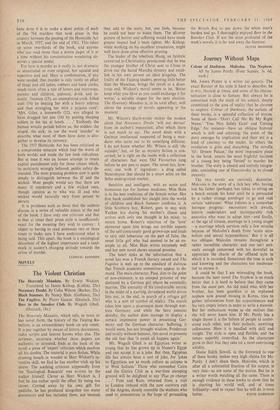Journey Without Maps
MR. JAMES PURDY is a writer sui generis. The exact flavour of his style is hard to describe; he is wry, farcical at times, and some of his charac- terisation is close to fantasy. But always he is concerned with the truth of his subject, deeply committed to the area of reality that he chooses to explore. Colour of Darkness, the earliest of these books, is a splendid collection of stories. Some of them—Don't Call Me By My Right Name,' You May Safely Gaze' and 'Cutting Edge,' for instance—have an oblique humour which is deft and arresting; the point of the story emerges by implication and their wit is a kind of courtesy to the reader. In others the revelation is grim and disturbing. The novella `63: Dream Palace,' the most impressive piece in the book, enacts the most frightful incident of a young boy being `forced' to murder his brother. The story is absurd and entirely imagin- able, reminding one of Dostoievsky in its closed intensity.
The two novels are curiously dissimilar. Malcolm is the story of a rich boy who, having lost his father (perhaps), has taken to sitting on a bench outside his hotel until he is persuaded by a rather strange astrologer to go and visit certain 'addresses.' What follows is a somewhat baroque progress: encounters with dwarfs, bizarre undertakers and incomparably rich neurotics who want to adopt him—and finally, at the age of sixteen, marriage to a young singer -a marriage which survives only a few months because of Malcolm's death from 'acute alco- holism and sexual hypermsthesia.' But it is all too oblique. Malcolm remains throughout a rather incredible character, and one isn't seri- ously enough concerned with his downfall to appreciate the charm of the offhand style in which it is recorded. Sometimes the tone is arch and knowing and the characters too insubstan- tial to excuse it.
It could be that I am misreading the book, because the later novel The Nephew is so much better that it is hard to believe that they came from the same pen. An old maid who, with her brother, has been guardian to an orphaned nephew now posted missing in Korea, tries to gather information from his acquaintances and his very empty letters in order to write a memoir. But her enthusiasm wanes as she realises that she will never know him. If Mr. Purdy has a single theme it is the failure of people tO under-
stand each other, and their pathetic, unwitting callousness. Here it is handled with skill and insight. The style is open and flexible, and the tempo superbly controlled. As the characters grow in their losS they take on a most convincing solidity.
Dame Edith Sitwell, in the foreword to one of these books, makes very high claims for Mr.
Purdy. I don't share them. Malcolm, which is
after all a substantial fraction of his output, is very thin—as are some of the stories. But he is a writer worth watching all the same. There is enough evidence in these books to show that he is charting his world well, and at times brilliantly—and to expect that he will do it even






































 Previous page
Previous page